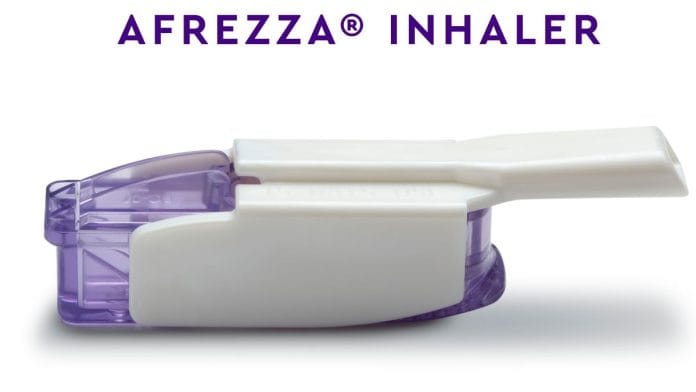New Delhi: India is set to see the launch of Afrezza—the only rapid-acting, inhaled insulin to help control high blood sugar in adults with type 1 or type 2 diabetes—ten years after the treatment was approved by the Food and Drug Administration (FDA).
The drug, manufactured by Connecticut-based biopharmaceutical company MannKind Corporation and launched in the United States in 2015, received necessary regulatory approval from India’s Central Drugs Standard Control Organisation (CDSCO) this week.
Mumbai-based pharmaceutical giant Cipla will distribute and market the drug in India.
Inhaled from the mouth at the beginning of a meal, Afrezza dissolves rapidly into the lungs and delivers insulin quickly to the bloodstream, Cipla said, adding that the drug starts working within 12 minutes of inhaling and helps reduce rapid spike in sugar levels that occurs after meals. Its effect lasts for about two to three hours, closely resembling the body’s own response to insulin. This is the first and only non-injectable insulin to be developed for patients of both type 1 and type 2 diabetes.
Cipla is positioning Afrezza as a game-changer for insulin-dependent patients.
A report published in the Lancet last week said there were nearly 212 million (21.2 crore) people, who accounted for 23.7 percent of the population, living with diabetes in India in 2022. Of these, only about 38 percent were on medication. Durham-based market research firm IQVIA puts the number of total insulin patients in India at 5.48 million (50.48 lakh).
“By reducing the need for multiple daily insulin injections, we are offering a convenient solution for people living with diabetes mellitus, particularly those who are uncomfortable with needles, helping them manage their condition more effectively,” Umang Vohra, Cipla’s managing director and global chief executive officer, said in a statement this week.
Also Read: 2024 Physics Nobel for AI scientists. How they pioneered machine learning modelled on human brain
Insulin delivered via lungs
The drug uses an inhaler to quickly deliver rapid-acting insulin into the lungs and bloodstream via insulin powder. Technosphere insulin technology, a novel platform that allows for the delivery of peptides via the pulmonary route, is used to deliver the powdered drug.
Apart from the fact that the drug is set to hit the Indian market next year, Cipla did not share any details including the expected price of the medicine in the country which has gained the tag of being “the diabetes capital of the world”.
Some senior endocrinologists ThePrint spoke to underlined that the drug seems to be an innovation milestone, after the first global inhalable insulin Exubera, launched by New York-based biopharmaceutical firm Pfizer in the US in 2006 but withdrawn a year later.
Exubera, according to a statement issued by Pfizer in 2006, was also associated with lung cancer concern in some users.
“In theory, inhaled insulin completely eliminated the psychological barriers associated with subcutaneous insulin delivery, such as needle phobia and incorrect injection technique,” Dr Anoop Misra, endocrinologist and chairman of Fortis C-DOC Hospital for Diabetes and Allied Sciences in New Delhi, told ThePrint. He also pointed out that although patients and healthcare providers have been searching for alternatives to injectable insulin for years, Exubera failed, and the fate of Afrezza remains uncertain.
Dr Ambrish Mithal, chairman and head, endocrinology and diabetes, Max Healthcare, highlighted another challenge inhalable insulin poses: it may cause users to cough following sustained periods of use and it can’t be recommended to those with asthma, chronic obstructive pulmonary disease (COPD) or smoking habits. “It may be a cause for concern in many Indian cities with high pollution levels,” he told ThePrint.
Global & Indian trials
The microparticle used in Afrezza consists of two main components: human insulin in its most basic form, and an inactive ingredient.
These microparticles are inhaled deeply into the lungs, from which they are quickly absorbed into the body. According to the official website of MannKind, as Afrezza passes through the lungs, insulin is released into the bloodstream in less than a minute.
The CDSCO approval for the drug follows a phase 3 clinical trial conducted in 216 patients in India which, according to Cipla, showed a significant reduction in HbA1c levels—a blood test that measures a person’s average blood sugar levels—on taking Afrezza with anti-diabetes medications. The drug has been evaluated in over 70 clinical studies involving more than 3,000 patients, the company said, adding that it was approved in the US a decade ago and has been prescribed to tens of thousands of patients since.
Exubera: A failed experiment
Exubera, developed by Paris-based pharmaceutical firm InhaledTherapeutics and marketed by Pfizer, was the world’s first inhalable insulin.
Launched in 2006, it was also slated to come to the Indian market the following year. However, the company withdrew the product globally in 2007 citing poor sales volume.
A major reason why not many insulin-dependent diabetics were interested in Exubera, said Mithal, could be the fact that it came with an inhaler that was clunky and uncomfortable to use and was also not covered under insurance.
ThePrint reached Pfizer via email for comment but had not received a response by the time of publication. This report will be updated if and when a response is received.
However, Afrezza, which has been available in the US since 2015, has not replaced injectable insulins in a big way. This became evident in 2016 when Paris-based pharmaceutical firm Sanofi withdrew from a $925 million marketing agreement with MannKind for this drug.
“As an option for diabetics requiring insulin, Afrezza looks interesting but it is unlikely that this drug will take the diabetic medication market by storm,” another Delhi-based diabetologist, who wished not to be named, told ThePrint.
Mithal underlined that the factors that may work in favour of Afrezza include Cipla being a leader in inhalation therapy not only in India but worldwide, known for introducing cost-effective options, and the drug being indicated for both type 1 and type 2 diabetes patients.
(Edited by Radifah Kabir)






